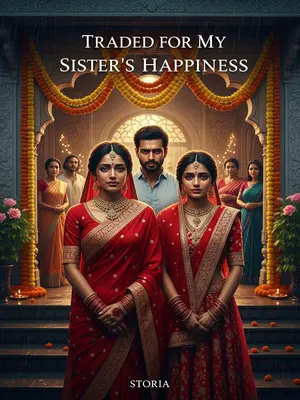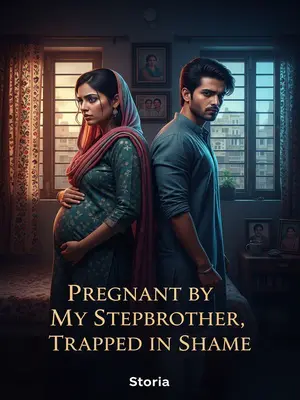Chapter 1: Reunion Under the Spotlight
For five lakh rupees, I pretended to be my brother and took care of his blind fiancée.
The day she opened her eyes to the world again, I vanished—no goodbye, no explanation.
When we met again, it was during a business interview.
I had become an intern reporter.
She had reclaimed her place, now the eldest young lady in charge of the Mehra family.
During the interview, someone asked, “Ma’am, people are saying it was Arjun sir’s care that got you through those tough years—is it true you two are getting engaged soon?”
The corners of her lips lifted slightly as she raised her hand, showing her ring. She twisted the ring slowly on her finger, as if drawing courage from the cold metal. “Yes, he and I are about to get engaged.”
Yet her gaze, whether on purpose or not, fell on me sitting in the corner.
Before the interview started, the venue was buzzing with chatter.
“The young lady being interviewed today is the head of the entire Sharma family.”
“I heard that five years ago she went blind and was even sent away from the Sharma home. If it weren’t for her fiancé’s unwavering care, she probably wouldn’t have survived.”
“Shh, lower your voice—”
I sat to the side, barely managing a smile. My nails dug deep into my palm.
In the stuffy Delhi hall, the faint whir of ceiling fans did little to break the heat. My palms felt clammy, and I pressed them hard against my worn jeans to stop the trembling. Even though everyone’s eyes were on the stage, I could feel the prickly weight of whispers curling through the air, that distinctly Indian sense of being watched and measured.
Suddenly, my senior Amit Bhaiya turned to me: “Rohit, go get me a glass of water.”
He didn’t even look up from his phone, but waved me off the way elders do, expecting promptness. It reminded me of home, when Ma would shout for chai in the middle of a TV serial. I nodded and hurried, feeling the invisible chain of junior-ship tugging me along.
Just as I reached the water dispenser near the door, the main entrance swung open.
The heavy glass door creaked and let in a gust of warm air mixed with a faint smell of agarbatti from the temple nearby.
Someone walked in.
My mind went completely blank.
In three years, Priya Mehra had changed almost beyond recognition.
Her once thin and frail frame was now tall and graceful, her features softer and more refined.
Her skin glowed under the harsh tube lights, her saree—an elegant cream with a gold border—draped just so, with a hint of jasmine flowers in her hair. There was a new poise to her, like she had learnt to hold her head high regardless of who was watching.
“Excuse me.”
She spoke calmly, her gaze sweeping past me as if I were a stranger, not lingering at all.
Surrounded by several security guards, she walked onto the stage.
The click of her heels against the marble floor echoed in my ears. The guards parted for her automatically, and the crowd’s chatter fell to a hush. For a second, I wanted to reach out, to call her by the name I’d whispered a hundred times in the dark. But I stayed frozen, a lump in my throat.
As she passed by me, I stood frozen.
It took a few seconds for me to snap back to reality.
The two years I spent by her side were when Priya was at her lowest. She’d been driven out of the Mehra family and blinded in a car accident, so of course she didn’t know what I looked like.
...That’s fine.
A dull ache pressed against my ribs. In India, faces come and go—servants change, drivers are replaced, but the ones who heal you or break you, you never really forget. I wondered if she’d ever tried to remember my voice.
When I returned with the glass of water, the interview had already started.
Priya sat on stage, calmly surveying the room, answering business questions with poise.
She gave each questioner a polite nod, her words precise, her hands folded neatly on the table. There was a regal air about her, the way she flicked back her hair and met each question head-on. Aunty-types in the audience were already whispering, admiring her composure, no doubt planning rishtas in their minds.
Suddenly, the side door near the stage opened.
Arjun walked in, smiling as he apologised to Priya: “Sorry, Priya. Something came up with the team, so I’m late.”
He straightened his suit and took a seat beside Priya.
Arjun’s entry was almost filmi—his white kurta crisp, hair slicked back, flashing that trademark grin for the cameras. He slid into the seat next to Priya like he belonged there, like nothing in the world could shake his confidence.
As Arjun swept in, the room’s energy shifted—half the women straightened their dupattas, the men nudged each other, and I shrank further into my chair.
The room fell silent for a moment, then the atmosphere turned warm and suggestive.
Amit Bhaiya, holding his glass of water, glanced at me as if he’d made a new discovery: “Rohit, you know, you and Arjun actually look a bit alike.”
I pressed my lips together, forcing a smile. “He’s a big star, you’re flattering me.”
Of course we look alike. Because he and I are real brothers.
For a second, I thought Amit Bhaiya would press further, but he was already distracted by the snacks arriving—samosas and chai, the usual Indian pre-interview fare. My heart pounded as I looked at Arjun’s easy laugh, his hand resting lightly near Priya’s.
But as Priya’s eyes met mine, I knew—our story wasn’t finished, no matter how much I tried to hide.



